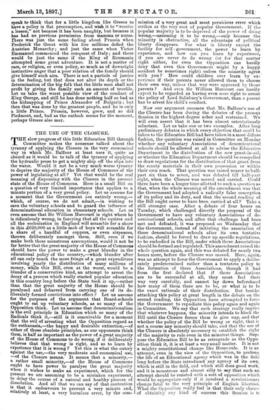TOPICS OF THE DAY.
THE SITUATION IN THE EAST. --wE suppose Lord Salisbury is managing things from his point of view very well. As the head of the Government which controls a Fleet stronger than all the remaining fleets in the Eastern Mediterranean, which dare spend money, if needful, on the largest scale, and -which is unhampered by the reluctance of conscripts to die for other people's protection, Lord Salisbury's word carries heavy weight, and he is clearly exerting his great influence to keep the Powers together and prevent pre- cipitate action. He does this, it is evident—we are not pretending to know secrets which we do not know—by suggesting compromises, by interposing delays, and generally by managing the Powers as a conciliatory Premier would manage a half-reluctant Cabinet. It has followed that the Greek answer to the " Identical Note," though firm in substance, was deferential to the Powers in form, that Greece has suggested compromises which are at least bases for discussion, and that no hasty or irrevocable action has yet been taken in Greek waters. There is still civil war in Crete, and the Admirals, the insurgents, and the Mussulmans are all fidgeting with their weapons; but nothing has occurred either in Crete or Athens which precludes further argument, or enables the German Emperor to say to other Sovereigns, ' See what unendurable commotions this revolutionary Kinglet is producing. Let us smash him as a lesson to the world.' The French Government, which is as much pressed by opinion as our own, as well as by its still subsisting alliance with Russia, has helped as much as it could, and has in particular, by its timely though dangerous pledge to consult the Chamber, secured a further element of lime. The Italian Government, which does not want a new Garibaldian movement, is unswervingly loyal to the West ; the Austrian Government has always reasons for moving slowly ; and the two young Emperors, though they might like more energy in repressing Greece, feel the influence of opinion, and realise in a measure that the stakes are frightfully big. The very cumbrousness of the Concert, its inability to move until the last man has had his grumble out and his dignity satisfied, is an instrument in Lord Salisbury's hands, giving him time to move slowly to his purpose, which is, we have no doubt, to secure a genuine autonomy for Crete, including its future right to dispose of its own destiny, without a European war, and without breaking the only weapon -which can peacefully coerce the Sultan and his armed clan. That wretched potentate, it should not be forgotten, has not been put in fetters yet. Whether Lord Salisbury is taking the wisest way to his great ends is a different matter. A little more nerve in his methods would, we conceive, as outside observers, help his progress greatly. After all, the German Emperor has not got a great Fleet, and the Russian Emperor must greatly dread an alliance between France and Great Britain, and Lord Salisbury might, we think, have shown a little more insistence as against the common enemy of Europe, the Sultan. We see no reason whatever why that Sovereign should not be ordered, as a dependant of Europe kept on his throne only by a misjudged toleration, to withdraw his troops from Crete at once, why the Greek troops under an international Viceroy should not be permitted to keep order in Crete, or why Crete should not be made, like Cyprus, an island paying tribute, but in all other respects relieved of Asiatic authority. It may be impossible to procure a plebiscite at once, because hereditary Monarchs think plebiscites evil examples. Still we can quite conceive that Lord Salisbury is bound by a dozen invisible withes, personal malignities and jealousies some of them, and personal vanities most of the remainder, which, being the malignities and vanities of great Sovereigns, must be treated with respect, and as yet he must be pronounced fairly successful. Nothing, it is true, has been finally settled, or will be for some days. There is an infinity of work yet to be done in Crete alone, and there are elements in the situation which must create deep anxiety ; but as yet the Concert moves on lumbering, and the curious instinct of the financial classes that there would be no open war has so far been justified. Nobody has yet fired cannon except as per agreement with everybody else. Those financial classes, however, often make huge mis- takes, because they reckon that human beings are always governed by their " interests," which is absurdly false, or there would be no wars, and the rocks ahead are so numerous that no care or skill in steering may suffice to avoid them all. It does not much matter to Europe whether civil war continues in Crete or not, but it does matter to Greece, and the wit of all the Powers seems as yet inadequate to a working scheme for its prevention. Only the Devil can know what the Sultan intends, and whether the perplexities of the Powers and his own huge levies will not tempt him to indulge himself with another massacre at Constantinople, where a street riot between Greeks and Turks might in a moment fire the heaped-up magazine of hates. No one has the smallest idea what the German Emperor will do on any given day, or whether at the last moment he will not retire because somebody has given Lord Salisbury the credit of a proposal. The policy of the Russian Government is still obscure, and may include movements which would terminate the Concert at once. And the best-informed diplomatists allow that they are ignorant of the precise extent of danger on the borders of Thessaly, where ;masses of armed men are concentrating, some of them nearly mad with race-hatred, with the sullen pride of ascendency, and with the recollections of intolerable wrongs. It is all very well for the Greeks and Bulgarians, who have been free for years, to submit to " wise and moderate counsels," and to move forward or retire as they are bid ; but the people of Macedonia and Epirus and Albania, Greek and Slav alike, are slaves still, with Pashas and their whips among them, and fired with a hope of immediate emancipation, or possibly of immediate vengeance. Will they sink back contentedly, in fear lest Europe should be wrapped in war ? What is Europe to households whose masters fear that their daughters will be carried off by force to Turkish harems, or whose cattle are requisitioned on the faith of bonds which it is not intended to pay ? The pressure of Europe on them is not as atmospheric as it is on the Cretans, who can see from the hills the irresistible ironclads lying all round the eastern half of the island with steam up. The Macedonians know that Nicholas II. and Francis Joseph are great potentates, but all the forces they see are masses of their old oppressors, the Asiatic Turks, and other masses of their friends, the armed Greeks of the West. They have been betrayed twice in this generation, they are sick with hope deferred, they may move or they may be massacred, and in either case the Greeks must defend them, if the Powers should in consequence shell Athens within the next half-hour. It is at this point, and not at Canea, that the true danger lies, and regarding this point all the Govern- ments are silent and inactive. They have suffered Turkey to accumulate a large army, which will not be paid, and will be consequently eager for plunder, and consequently, from common decency, they have been unable to prevent King George from sending his army to the frontier. Two of the Great Powers are, of course, should they agree, able to stamp out the fires caused by the explosion in Macedonia when it has happened, but all the Six Powers united could not prevent its happening. Even if Greece submits, and allows the Cretan towns to be devastated by the Turkish troops left to "protect" them, this danger will not be over, will rather be exasperated, for the Turks will believe that whatever they do their master can protect them. Those who believe that the Redifs will retire in peace to Asiatic homes do not know what an unpaid Asiatic soldiery is like, or how thoroughly it believes that its own claim comes before that of any peasantry in the world.
It is fear of a movement in the Balkans, which might bring Austria into the field, which first of all makes Russia so hostile to Greece ; but there is, we imagine, another motive too. The Russian Court cannot endure that little States belonging to the Greek Church should exhibit independence. Look how she has treated Roumania, Servia, and Bulgaria. So long as they are submissive they are petted and protected, but the moment they act for themselves they strike the Russian statesmen as " rebellious," and are punished accordingly. A feeling of the same kind, though uncomplicated by the religious ques- tion, influences the German Emperor, and is not without its effect even among ourselves. One-half the people you speak to think that for a. little kingdom like Greece to have a policy is flat presumption, and wish it to "receive a lesson," not because it has been naughty, but because it has had no previous permission from mamma or nurse. There was just the same feeling about Prussia when Frederick the Great with his five millions defied the Austrian Monarchy ; and just the same when Victor Emmanuel commenced the conquest of Italy; and there would be just the same if the King of Roumania attempted some great adventure. It is not a matter of race, or religion, or even policy, so much as of downright instinctive anger that a poor relation of the family should give himself such airs. There is not a particle of justice in the feeling, but that does not alter its depth or the determination of the big folk that the little man shall not profit by giving the family such an amount of trouble. Let us take the worst possible view of the conduct of King George, and still he has done nothing half so bad. as the kidnapping of Prince Alexander of Bulgaria ; but then that was done by the greatest people, and he is only a little Prince. Prussia, however, grew, and so did Piedmont, and, bad as the outlook seems for the moment, perhaps Greece also may.



































 Previous page
Previous page